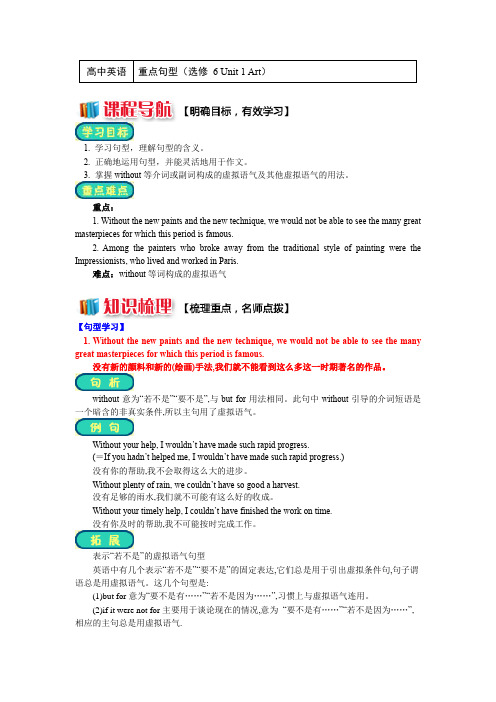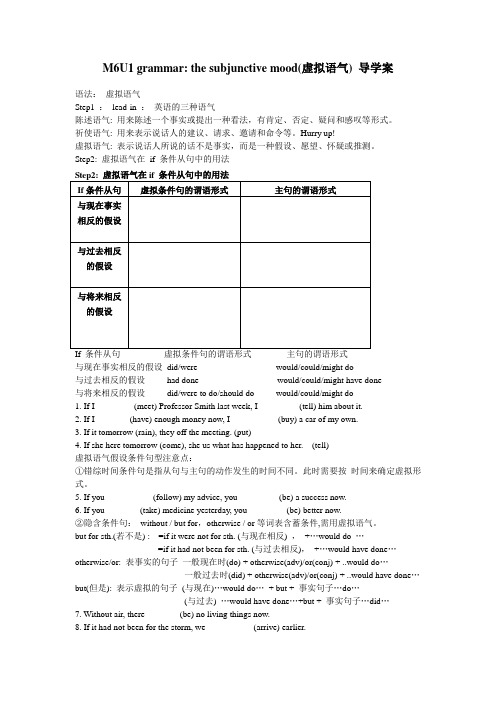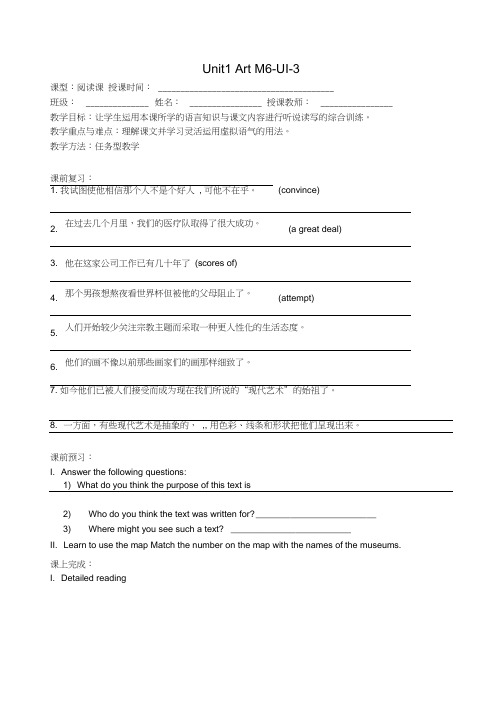2018-2019学年高二英语新人教版选修6学案:Unit 1 Art-语法篇(学生版)
- 格式:doc
- 大小:187.34 KB
- 文档页数:15

人教版高中英语选修6《Unit 1 Art》教案人教版高中英语选修6《Unit 1 Art》教案【一】教学准备教学目标a. 重点词汇和短语realistic, abstract, religion, religious, sculpture, gallery, belief, consequent, consequently, aim, symbol, value, focus, possession, convince, impressionism, impressionist, shadow, ridiculous, nowadays, attempt, predict, focus on, a great deal, scores ofb. 重点句式There are so many ... that it would be impossible to ... P1People became focused more on ... and less on ... P2If the rules of perspective had not been discovered, people would not have been able to paint ... P2教学重难点a. 重点词汇和短语realistic, abstract, religion, religious, sculpture, gallery, belief, consequent, consequently, aim, symbol, value, focus, possession, convince, impressionism, impressionist, shadow, ridiculous, nowadays, attempt, predict, focus on, a great deal, scores ofb. 重点句式There are so many ... that it would be impossible to ... P1People became focused more on ... and less on ... P2If the rules of perspective had not been discovered, people would not have been able to paint ... P2教学过程Teaching procedures:【写一写】(Some pictures are given to the students to learn some about western paintings)写出所有相应关于作品的英语名称______________________________________________________________________________________________________________________ _______________________【想一想】Which style of paintings do you prefer, western or Chinese? Why?___________________________________________________________ __________________【skimming】Skim the text and complete the main idea of it.The text mainly tells us _____ of the major movements in ________ art over the centuries.绘制时间轴课文P3---exercise 1【判一判】1. Western art has changed very little over the last seventeen centuries.2. Painters in the Middle Ages did not use perspective.3. Impressionists painted landscapes.4. You cannot recognize any object in abstract modern art.5. In the Renaissance most artists painted indoors.6. Abstract art is still art style today.【选一选】Choose the best answer.1. According to the text, art is least influenced by________.A. social changesB. the way of lifeC. the development of agricultureD. beliefs of a people2. When did painters mainly focus more on people and less on religion?A. From 5th to 15th century AD.B. From 15th to 16th century.C. From late 19th to early 20th century.D. From 20th century to today.3. Who were the first to paint outdoors?A. Painters in the Middle Ages.B. Painters in the Renaissance.C. The Impressionists.D. Contemporary painters.【巩固训练】讲练通---P2 retelling课后习题【Homework】课时跟踪训练人教版高中英语选修6《Unit 1 Art》教案【二】教学准备教学目标1. 知识与技能目标(1)通过阅读有关曼哈顿著名的艺术博物馆加深对博物馆的了解和认识。

1. 学习句型,理解句型的含义。
2. 正确地运用句型,并能灵活地用于作文。
3. 掌握without等介词或副词构成的虚拟语气及其他虚拟语气的用法。
重点:1. Without the new paints and the new technique, we would not be able to see the many great masterpieces for which this period is famous.2. Among the painters who broke away from the traditional style of painting were the Impressionists, who lived and worked in Paris.难点:without等词构成的虚拟语气【句型学习】1. Without the new paints and the new technique, we would not be able to see the many great masterpieces for which this period is famous.没有新的颜料和新的(绘画)手法,我们就不能看到这么多这一时期著名的作品。
without意为“若不是”“要不是”,与but for用法相同。
此句中without引导的介词短语是一个暗含的非真实条件,所以主句用了虚拟语气。
Without your help, I wouldn’t have made such rapid progress.(=If you hadn’t helped me, I wouldn’t have made such rapid progress.)没有你的帮助,我不会取得这么大的进步。
Without plenty of rain, we couldn’t have so good a harvest.没有足够的雨水,我们就不可能有这么好的收成。

M6U1 grammar: the subjunctive mood(虚拟语气) 导学案语法:虚拟语气Step1 :lead-in :英语的三种语气陈述语气: 用来陈述一个事实或提出一种看法,有肯定、否定、疑问和感叹等形式。
祈使语气: 用来表示说话人的建议、请求、邀请和命令等。
Hurry up!虚拟语气: 表示说话人所说的话不是事实,而是一种假设、愿望、怀疑或推测。
Step2: 虚拟语气在if 条件从句中的用法If 条件从句虚拟条件句的谓语形式主句的谓语形式与现在事实相反的假设did/were would/could/might do与过去相反的假设had done would/could/might have done与将来相反的假设did/were to do/should do would/could/might do1. If I ________ (meet) Professor Smith last week, I_________ (tell) him about it.2. If I _______ (have) enough money now, I __________ (buy) a car of my own.3. If it tomorrow (rain), they off the meeting. (put)4. If she here tomorrow (come), she us what has happened to her. (tell)虚拟语气假设条件句型注意点:①错综时间条件句是指从句与主句的动作发生的时间不同。
此时需要按时间来确定虚拟形式。
5. If you __________ (follow) my advice, you _________(be) a success now.6. If you _______ (take) medicine yesterday, you ________ (be) better now.②隐含条件句:without / but for,otherwise / or等词表含蓄条件,需用虚拟语气。

Unit1 Art M6-UI-3课型:阅读课授课时间:_______________________________________班级: ______________ 姓名: ________________ 授课教师: ________________ 教学目标:让学生运用本课所学的语言知识与课文内容进行听说读写的综合训练。
教学重点与难点:理解课文并学习灵活运用虚拟语气的用法。
教学方法:任务型教学8. 一方面,有些现代艺术是抽象的,,, 用色彩、线条和形状把他们呈现出来。
课前预习:I. Answer the following questions:1) What do you think the purpose of this text is2) Who do you think the text was written for? ________________________3) Where might you see such a text? ________________________II. Learn to use the map Match the number on the map with the names of the museums.课上完成:I. Detailed reading1. 比起做某事更愿意做某事3种表达方式:2. He nry Clay Frick, died in 1919, _______ his house, furniture and________________ to the America n people.1) make a collect ion of, 收藏havea large collect ion of, 收藏有大量的,2) 父母在事故中丧生,留下了儿子孤单一人。
3. have a prefere nee for ______________关于perfer的习惯用语:Eg.比起西餐我更喜欢中餐。

2018-2019学年高二英语新人教版选修6学案:Unit1Art-词汇篇(学生版)Unit1 Art-词汇篇单词讲解:1.Abstract1)Adj.深奥的,抽象的Astronomy is an abstract subject. 天文学是一门深奥的学科。
The word “honesty” is an abstract noun.Beauty is abstract but a house is not .美是抽象的,房子是具体的。
2)V.○1“提炼” “抽取”The workers are abstracting metal from ore.工人们正在由矿砂提炼金属。
Rubber is abstractedfrom trees.橡胶是从树木提取的。
Salt can be abstracted from sea water.盐是从海水中提取出来的。
○2“转移(注意)等distract one’s attention from sth从……上转移开某人的注意力Nothing can distract his attention from his work.○3“概括,写摘要”He is abstracting a story for a book review.他在为一篇书评撰写故事摘要。
3)n.an abstract of a lecture一个演讲的摘要2.would rather do sth情愿做….would rather sb did sth情愿sb做…情愿做….而不愿意做…:would rather do sth than do sth= would do sth rather than do sth= prefer to do sth rather than do sth= prefer doing sth to doing sthI would rather stay at home today. 我今天宁愿待在家里。

Unit 1 Art重要词汇 相关提示重要词汇 abstract adj 。
抽象的;深奥的 n . 摘要注意abstract 的意义和用法 faith n .信任;信心;信念注意faith 和其派生词faithful 及faithfully 的用法 aim n .目标;目的 vi .& vt .瞄准;(向某方向)努力掌握以aim 为核心的短语 typical adj .典型的;有代表性的牢记typical 及其短语be typical of 的用法 evident adj . 明显的;明白的掌握evident 的意义和用法 adopt vt .采用;采纳;收养掌握adopt 和adapt 的区别 possess vt .拥有;具有;支配牢记possess 和possession 构成的短语 coincidence n .巧合(的事);(事情、口味、故事等)相合 牢记coincidence 和 by coincidence 的用法重点句型1.Would you rather have Chinese or。
.?→would rather do。
or do..。
“愿意做……还是做……”,表示选择。
2.As there are so many different styles of Western art,it would be impossible to describe all of them in such a short text。
→It would be impossible to do。
做……是不可能的。
(it为形式主语,真正的主语为to do。
.。
)3.But it was evident that ideas were changing in the 13th century。
..→It is evident that.。
. ……是很显然的。
4.Among the painters who broke away from the traditional style of painting were the Impressionists,who lived and worked in Paris。
unit 1 ArtGrammar虚拟语气Subjunctive Mood教案一:分类1在英语中有三种语气,陈述语气,祈使语气和虚拟语气2 虚拟语气表示说话的人的一种愿望、意见、命令、要求,有时候是一种非真实的假设、料想或者是不可能实现的与事实相反的愿望。
二、形式虚拟语气经常用在if引导的条件状语从句中,在条件句中做出和事实不相符的一种假设。
a.和现在事实相反的假设如:If I were you, I would study hard.If he had enough money, he would buy a puter.b.和过去事实相反的假设如:If you had e five minutes earlier, you would have met him.If they had been treated in time, they would not have died.c.和将来事实相反的假设如:If I were to do it, I would do it in another day.If it rained tom orrow, we wouldn’t be able to go on piic.d.混合条件句混合条件句是指条件句是对过去事实相反的假设,而主句则表示现在的某种情况。
三、注意事项①如果从句中有were、had或者should时,则可以省略if,并将were、had或者should提前至句首,构成部分倒装,但如果是否定句,则否定词not不提前。
如:Were I to be young again, I would study medicine.=If I were to be young again, I would study medicine.Had you not left so early, you might have missed the train.=If you had not left so early, you might have missed the train.②用介词短语代替条件状语从句,常用的介词有with, without, but for.如:Without your help, we couldn’t have finished the work ahead of time.=But for your help, we couldn’t have finished the work ahead of time.=If it had not been for your help, we couldn’t have finished the work ahead of time.=Had it not been for your help, we couldn’t have finished the work ahead of time.③在句中出现了表示转折的连词,如or, or else, otherwise等,如果句意和事实不符也要用虚拟语气。
unit 1 ArtGrammar虚拟语气Subjunctive Mood教案教学内容分析This teaching period mainly deals with the grammar:the subjunctive mood.In the English language verbs are often divided into three different moods—the indicative mood,the imperative mood and the subjunctive mood.The indicative mood is used to indicate a fact or put forward a viewpoint.The imperative mood is used to express direct commands or requests.It tells you to do something.It is also used to signal a prohibition,permission or any other kind of exhortation.The subjunctive mood is used to express a condition which is doubtful or not factual.It is most often found in a clause beginning with the word “if”.It is also found in noun clauses,following a verb that expresses a doubt,a wish,regret,request,demand,or proposal.The following are verbs typically followed by clauses with the subjunctive mood:ask,demand,determine,insist,move,order,prefer,recommend,regret,request,require,suggest,wish.In this period we will focus on only part of the usages of the subjunctive mood,that is,the subjunctive mood beginning with the word “if” and that following the verb “wish”.三维目标设计Knowledge and skills1.To get the students to know the structure of the subjunctive mood.2.To let the students learn the usages of the subjunctive mood.3.To enable the students to use the subjunctive mood correctly and properly.Process and methods1.To ask the students to read the reading passage again,pick out the sentences with the subjunctive mood from the reading passage and translate them into Chinese.2.To ask the students to discover the structure and usages of subjunctive mood by comparing a lot of example sentences.3.To ask the students to do the exercises in Discovering useful structures on Page 5 forstudents to master the subjunctive mood.4.To ask the students to summarize the subjunctive mood.5.To ask the students to do the exercises in Using Structures on Page 43 and some other additional exercises for consolidation.Emotion,attitude and value1.To get the students to become interested in grammar learning.2.To develop the students' ability of comparing and summarizing.教学重、难点1.To get the students to master the structure and usages of the subjunctive mood.2.To enable the students to learn how to use the subjunctive mood correctly.Revision1.Check the homework exercises.2.Dictate some new words and expressions.3.Translate the following sentences into English:(1)那个项目花费了大量金钱。
12.___________(adj.)representativeUnit 1 Art典型的,有代表性的13__________(adj.) 荒唐的,可笑的第一,二(adv. )therefore因课时导教案此,所以( Warming up,II.Phrases:pre-reading and reading )I. 要点单词1. 偶然地,巧合_____________/______________/_____1._________(adj.) 现实(主义)的,逼____________ 真的反义词 ________(adj) 抽象的,深奥的2. 很多,大批(只修饰不行数名词)_________________/________________2.________ ( n. )相信,信心,信念_______________(adv.) 忠实地(只修饰可数名词)3.._________(vt.) 拥有,拥有,支配______________/__________________/ ________________(n.) 全部,财富______________-4 . __________(adj.) 显然的,理解的(既修饰可数又修饰不行数)(obvious) ________________(n.)凭证______________/____________/______ ________5.___________(n.) 塑像3. 集中精力于,关注6._____________(n.). 画廊,美术陈设室_____________/______________4. 另一方面 ___________________5.打7.____________(n.) 目标,目的算,试图做某事 _____________ (vi/vt. )对准,向某方向努力8.___________(vt.)6. 很多______________ 二十个采用,采用,收养9.___________(n.)________________ 杰作,名著10.___________(n/vt)7. 在十九世纪末 ___________________ 努力,试试,企11._________(n.) 8. 对瞄准,打算图技术,方法,____________________ 技术9.占有,拥有_____________________/____________ ____________III.依据提示,达成以下句子。
Unit1 Art-语法篇虚拟语气的用法虚拟语气表示一种假设的情况,或一种主观的愿望,即动词所表示的动作或状态并非事实,或不可能实现。
英语虚拟语气的形式有下列几种:一、虚拟语气用于条件状语从句注意:主句中的should通常用于第一人称,would可用于任何人称,同时也可根据意思用情态动词could, might等代替should, would。
1.与现在事实相反If had the time, John would make a trip to China to see the Great Wall.If I were you, I would give up drinking immediately.2.与过去事实相反If I’d known that it was going to rain, I wou ld never have gone for a walk in the country.3.与将来事实相反If it were to/should rain tomorrow,the meeting would be put off.If you went there next time, you would see what I mean.4.错综时间虚拟语气当条件状语从句表示的行为和主句表示的行为所发生的时间不一致时,动词的形式要根据它所表示的时间来调整。
例如:If I were you, I would have gone home.(从句说的是现在,主句指的是过去。
)If you had followed the doctor's advice, you would be quite all right now.(从句说的是过去,主句指的是现在。
)If the weather had been more favorable, the crops would be growing still better.其它状语从句1.方式状语as if(as though)如果从句表示与现在事实相反,谓语动词用一般过去时;表示与过去事实相反,谓语动词用"had+过去分词";表示与将来事实相反;谓语动词用"would(might, could)+动词原形"。
例如: He looks at me as if I were mad.He spoke English so fluently as if he had studied English in England.但as if(as though)后的从句也常用陈述语气,这是因为从句中的情况往往是可能发生的或可能被设想为真实的。
例如: It looks as if our side is going to win.2.目的状语in order that, so that 从句谓语动词用" may/might, can/could)+动词原形"。
例如: She listened carefully in order that she might discover exactly what he wanted.3.连词引导的条件状语从句:in case, unless, supposing ,providing, on condition that从句谓语动词用(should)或" might, could)+动词原形"。
4.连词引导的步状语从句 lest ,for fear that等We hid behind some bushes for fear that passer-by should see us.二、虚拟语气用于宾语从句1.Suggest, advise 等动词之后宾语从句须用虚拟语气,其句子结构如下:注意:在此结构中that不可省略;should省不省均可。
He suggested that they (should ) stop smoking.They demanded that the black people should be treated as well as white people.如果that 引导的从句所表达的内容是事实,也可用陈述语气。
He insists that he is right. 注意:insist作"力言"、"强调"解时,宾语从句不用虚拟语气。
只有当insist作"坚持(应该)"解时,宾语从句才用虚拟语气。
例如:Mike insisted that he had never stolen anything.I insisted that you give me my money back.2."wish+宾语从句"表示不能实现的愿望,汉语可译为"可惜……"、"……就好了"、"悔不该……"、但愿……"等。
表示现在不能实现的愿望,从句的谓语动词用过去式;表示将来不能实现的愿望,用"would(could)+动词原形";表示过去不能实现的愿望,用"had+过去分词"或"(could)would+have+过去分词"。
例如:wish的用法注意:wish与hope接宾语从句的区别在于:hope表示一般可以实现的希望,宾语从句用陈述语气。
wish表示很难或不大可能实现的希望,宾语从句用虚拟语气。
试比较:(1)We hope they will come,(We don’t know if they can come.)(2)We wish they could come,(We know they are not coming.)3.虚拟语气在would rather/would sooner/would just as soon后接从句:I'd rather you paid me now.(从句用过去时指现在)I would rather they came tomorrow.(从句用过去时指将来)I'd rather she hadn't done that.(从句用过去完成时指过去)(此句中的would可看作是表愿望的实义动词)三、虚拟语气用于主语从句在主语从句中,谓语动词的虚拟语气结构用"should+动词原形"的结构,表示惊奇、不相信、惋惜、理应如此等。
例如:It is necessary( appropriate/ crucial / desirable/dreadful / essential/important /improper incredible/ indispensable / insistent /natural / preferable / possible / probable/ proper / right/.significant / surprising /strange/ tragic / urgent /vital /wrong etc.)that we should clean the room every day.It was a pity(a shame, no wonder, etc.)that you should be so careless.It will be desired(suggested, decided, ordered, requested, proposed, etc.)that she should finish her homework this afternoon.a 在上述三种主语从句中,should意为"应该"、"竟然",可以省去,但不可换用would。
主句所用动词的时态不限。
注意:这种从句表示的是事实。
如果说话人对这种事实表示惊奇,就可用虚拟语气。
反之,如果不表示惊奇,that从句也可用陈述语气。
例如:It is strange that he did not come yesterday.It is a pity that you can't swim.四、虚拟语气用于表语从句、同位语从句要求:demand requirement request motion pray insistence建议:suggestion advice proposal recommendation motion命令、决定:order command decision determination resolution其它:plan desire idea necessity preference等名词的表语从句和同位语从句,其谓语动词要用虚拟语气的结构"(should)+动词原形"。
例如:We all agreed to his suggestion that we(should)go to Beijing for sightseeing.My idea is that he (should)do exercises first.五、虚拟语气的几种特殊用法1.省掉if的条件从句倒装结构:(should, had, were)Had you ask ed me, I would have told you. (=If you had asked me,…)Were I you, I would be back home. (= If I were you, …)Should I know it, I would tell you. (= If I should know it, …)2.有时虚拟条件不用条件从句而用不定式、分词、介词、名词、连接词或定语从句来表示,如:Atrue friend would not do such a thing. (=If he were a true friend, he...)Without water, we would not live. (=If there were no water,…)But for your help, I couldn’t have finished it.(=If you hadn’t helped me,…)3.虚拟语气用于定语从句:It’s (high) time that…+动词过去式或should+动词原形,(should不能省略,be用were)"来表示,意为"(现在)该……"。